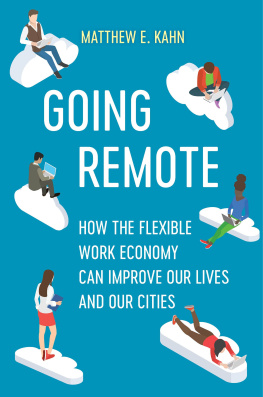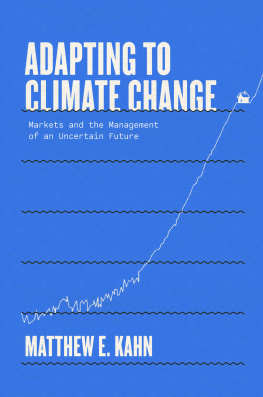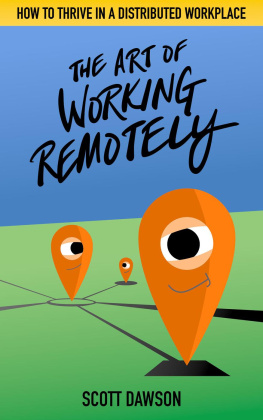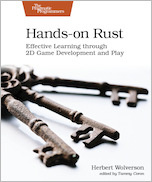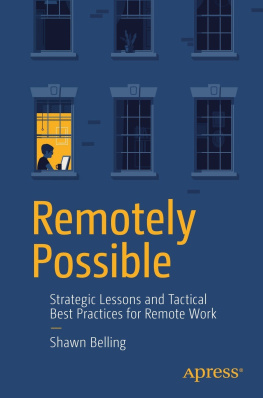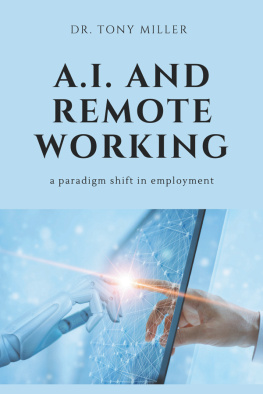Introduction
No Going Back
We are not going back to the work world of January 2020. Going forward, perhaps as many as 35 percent of the workforce will work from home at least a few days a week. Nobody anticipated this shift in our work arrangements.
In recent years, major companies such as Amazon, Apple, Facebook, and Google have built new corporate campuses. They hired leading architects to design buildings and outdoor spaces where people would want to spend time, and in doing so, remove both the real and self-defined walls that often separate work, socializing, wellness, and creativity. One Apple executive told Wired Magazine , We dont want you to feel like youre in a casino. We want you to know what time of day it is, what temperature it is outside. Is the wind really blowing? That was Steves original intention, to sort of blur that line between the inside and outside. It sort of wakes up your senses. Apple built a 2.8 millionsquare-foot building that cost billions of dollars. The 175-acre Cupertino campus, Apple Park, opened in 2017 and was filled with 12,000 people.
For much of 2020 and 2021, these buildings have been quiet. The sudden onset of the COVID-19 pandemic in 2020 sent tens of In this sense, WFH is an experience good. This economics term refers to situations where we underestimate how much we value an experience until we try it. When the first Star Wars movie was released in 1977, I could never have imagined how much I would enjoy it. A written explanation of the plot would not have conveyed its power and excitement.
This book explores how our recent nationwide experiment with WFH will influence our nations economic geography over the next decades. We are more likely to unlock the full potential of this new opportunity if we can anticipate the opportunities and challenges posed for workers, firms, and local governments by the WFH option.
Just before the COVID crisis hit in early 2020, we faced four social challenges. First, we spent too much time commuting. Second, rents were too high in Americas most productive cities. Third, local economies were stagnant in many rural places and in postindustrial cities such as Baltimore. Fourth, many women and many minorities did not have the same economic success and access to opportunities as white men. This book explores how the rise of WFH can improve our quality of life and help us to overcome each of these four challenges.
The gains from WFH differ depending on ones life goals and responsibilities. As I discuss in chapter 1, a young ambitious person who is eager to make her mark will continue to value the face-to-face interactions at work as she seeks to build up her skill set, network, and reputation. At the same time, a middle-aged worker who has an aging mother in Iowa may greatly benefit from the flexibility offered by engaging in remote work. These two examples highlight a central theme of this book. We differ with respect to what we gain from working from home. No one expected that millions of us would have the opportunity to engage in WFH. Over the next few years, workers who anticipate having the option to engage in WFH on at least a part-time basis will have strong incentives to reconfigure their plans and to invest in the skills to make the most of this new opportunity.
While the rise of WFH offers potentially large benefits for eligible workers, it also could impose costs on US workers. Such workers will face greater international competition as US workers compete with international remote workers. Economic analysis offers insights here about how younger workers can position themselves in terms of human capital investment to better adapt to the new rules of the game.
Economists are debating how our economy will look in the aftermath of the pandemic. Nobel laureate Paul Krugman has argued that our cities and our urban work life will basically return to our pre-pandemic experience. He writes: So the best bet is that life and work in, say, 2023 will look a lot like life and work in 2019, but a bit less so. We may commute to the office less than we used to; there may well be a glut of urban office space. But most of us wont be able to stay very far from the madding crowd.
On one level, I agree with him. Through billions of dollars of past investment in tall buildings and urban infrastructure (including the electricity grid, transit systems, and sewage systems), we have built up durable capital in major hubs like Boston, New York City, and San Francisco. This durable capital has not been fully utilized in 2020 and 2021 but the excitement and buzz of cities will certainly return. As some people choose to move to more far-flung areas and engage in WFH there, center cities will become more affordable and attract younger people who want to be closer to the action. In our diverse society, some people will respond to the rise of WFH and move farther from city centers, but at the same time a type of musical chairs occurs that creates new opportunities for those who want to live in center cities. In an economy that is continually upgrading old housing and building new housing, this does not have to be a zero-sum game. The economic geography of our cities shifts over time in response to supply and demand forces.
This book traces the emerging improvements in quality of life made possible by having more freedom over how we allocate our scarce time. On any given day and at any given hour, many people will be working from home. They will have control over their schedules and their lives that will significantly increase their flexibility as to how they live. On a snowy day in February in Chicago, some may choose to work from home. On a March day, a suburban dad may attend his sons play and work from home that afternoon.
In the recent past, we spent too much time commuting. WFH opens up new possibilities for productively doing our job while making the most of our scarce time. My teacher, Nobel laureate Gary Becker, emphasized the central role of how we spend our time in determining our health and our quality of life. I will argue that the rise of WFH creates new quality-of-life opportunities for workers who do not work from home. WFH workers represent a large enough share of the population such that their choices will shift real estate prices both within and across cities and regions. As some WFH workers spread out, this creates new opportunities for service-sector workers to move to such areas, which will both lower the rents they pay for housing and expand their menu of lifestyle possibilities.

